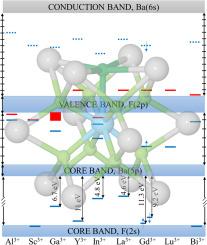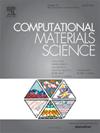Cross-luminescence in BaF2 crystals doped with M3+ and RE3+ ions: Hybrid density functional theory study
IF 3.3
3区 材料科学
Q2 MATERIALS SCIENCE, MULTIDISCIPLINARY
引用次数: 0
Abstract
Radiation resistant inorganic materials emitting cross-luminescence are one of the most prospective candidates for new generation ultrafast detectors for medical tomography. Radiative transitions leading to cross-luminescence occur between valence and core states, and therefore calculations of the electronic structure of doped materials can explain ultrafast transitions and predict new cross-luminescent materials. In current work we demonstrate results of ab initio calculations of undoped and doped BaF by means of hybrid density functional theory. As a result of the work, the density of states (DOS) for nominally pure BaF and a whole series of BaF doped with various trivalent ions were obtained. The positions of the core energy levels of dopant ions lying between the Ba(5p) zone and the F(2s) zone, as well local geometries and formation energies were calculated. Our calculations show that the 5p states of impurity ions can be located below the 5p zone of barium by several eV. This opens up opportunities for transitions from the core 5p Ba zone to impurity 5p states, which might be involved in experimentally observed appearance of an ultrafast component in doped BaF.

掺杂 M3+ 和 RE3+ 离子的 BaF2 晶体中的交叉发光:混合密度泛函理论研究
发射交叉发光的抗辐射无机材料是新一代医学断层扫描超快探测器最有前景的候选材料之一。导致交叉发光的辐射转变发生在价态和核态之间,因此,计算掺杂材料的电子结构可以解释超快转变并预测新的交叉发光材料。在当前的研究工作中,我们展示了通过混合密度泛函理论对未掺杂和掺杂 BaF2 进行的 ab initio 计算结果。通过这项工作,我们获得了名义上纯的 BaF2 和掺杂了各种三价离子的一系列 BaF2 的状态密度(DOS)。计算了位于 Ba(5p) 区和 F(2s) 区之间的掺杂离子核心能级的位置,以及局部几何形状和形成能量。我们的计算表明,杂质离子的 5p 态可能位于钡的 5p 区以下几个 eV。这为从钡的核心 5p 区到杂质 5p 态的跃迁提供了机会,而实验观察到的掺杂 BaF2 中出现的超快成分可能与此有关。
本文章由计算机程序翻译,如有差异,请以英文原文为准。
求助全文
约1分钟内获得全文
求助全文
来源期刊

Computational Materials Science
工程技术-材料科学:综合
CiteScore
6.50
自引率
6.10%
发文量
665
审稿时长
26 days
期刊介绍:
The goal of Computational Materials Science is to report on results that provide new or unique insights into, or significantly expand our understanding of, the properties of materials or phenomena associated with their design, synthesis, processing, characterization, and utilization. To be relevant to the journal, the results should be applied or applicable to specific material systems that are discussed within the submission.
 求助内容:
求助内容: 应助结果提醒方式:
应助结果提醒方式:


